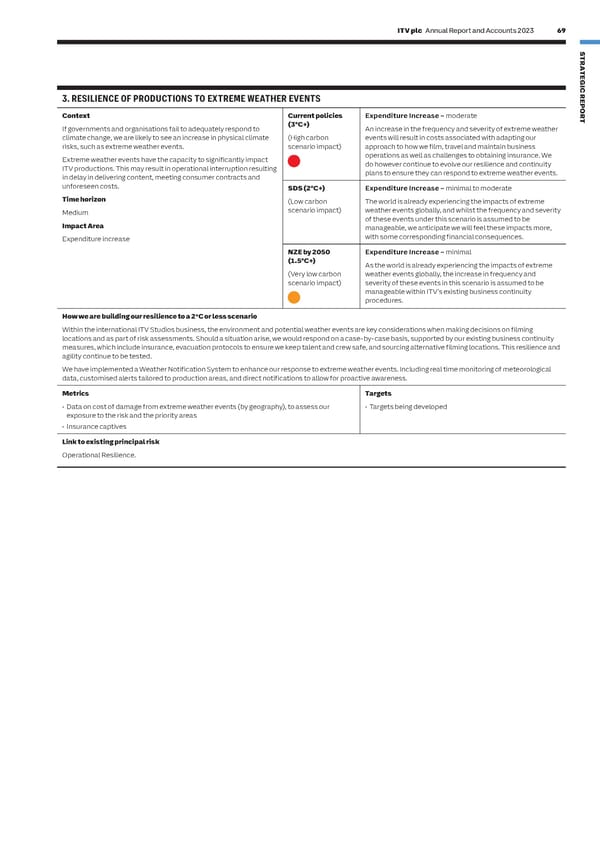68 ITV plc Annual Report and Accounts 2023 ITV plc Annual Report and Accounts 2023 69 S CLIMATE RELATED FINANCIAL DISCLOSURES CONTINUED T R A T E G I C R 2. INCREASED COSTS IN THE TRANSITION TO A LOW CARBON WORLD3. RESILIENCE OF PRODUCTIONS TO EXTREME WEATHER EVENTS E P O Context Current policies Expenditure increase – minimalContext Current policies Expenditure Increase – moderate R (3°C+) (3°C+) T All businesses will face costs associated with the transition to Net The Current Policies’ scenario assumes that no carbon pricing If governments and organisations fail to adequately respond to An increase in the frequency and severity of extreme weather Zero and a low carbon economy. Carbon emissions taxation is being (High carbon is introduced and therefore the increased costs are limited as climate change, we are likely to see an increase in physical climate (High carbon events will result in costs associated with adapting our imposed by more nations worldwide to limit and reduce carbon scenario impact) it stays business as usual.risks, such as extreme weather events. scenario impact) approach to how we film, travel and maintain business intensive activities causing climate change.Extreme weather events have the capacity to significantly impact operations as well as challenges to obtaining insurance. We We may be exposed to increased costs of operating in all areas of ITV productions. This may result in operational interruption resulting do however continue to evolve our resilience and continuity our business. This could come from increased environmental in delay in delivering content, meeting consumer contracts and plans to ensure they can respond to extreme weather events. SDS (2°C+)Expenditure increase – moderate regulation, carbon pricing or emissions taxation, investment in low unforeseen costs. SDS (2°C+) Expenditure Increase – minimal to moderate carbon technologies as well as throughout our supply chain. In (Low carbon Increased costs may be felt from the wider transition to a low addition, shifts in supply and demand due to climate related impacts scenario impact)carbon economy. However, the SDS scenario does not provide Time horizon(Low carbon The world is already experiencing the impacts of extreme may result in ITV not being able to source materials for production an indication of how government or regulation may intervene Mediumscenario impact)weather events globally, and whilst the frequency and severity due to costs.in this area. of these events under this scenario is assumed to be Impact Area manageable, we anticipate we will feel these impacts more, Time horizonNZE by 2050 Expenditure increase – moderateExpenditure increase with some corresponding financial consequences. Medium(1.5°C+) Increased costs may be felt from wider transitions to a low NZE by 2050 Expenditure Increase – minimal Impact Area (Very low carbon carbon economy. Highest impact expected in terms of (1.5°C+) scenario impact)increased costs passed on through the supply chain. As the world is already experiencing the impacts of extreme Expenditure increase (Very low carbon weather events globally, the increase in frequency and scenario impact) severity of these events in this scenario is assumed to be manageable within ITV’s existing business continuity How we are building our resilience to a 2 oC or less scenario procedures. We are actively seeking to limit the amount of carbon we emit in our business. We continue to focus on increasing our use of renewable energy, assessing the How we are building our resilience to a 2 oC or less scenario maturity of our suppliers in relation to managing climate related risks and partnering with peers to support an industry-wide transition approach. Examples of how we are building our resilience include:Within the international ITV Studios business, the environment and potential weather events are key considerations when making decisions on filming • Consolidating our London offices from three sites to two;locations and as part of risk assessments. Should a situation arise, we would respond on a case-by-case basis, supported by our existing business continuity • Focusing our office and productions investment on improving resiliencemeasures, which include insurance, evacuation protocols to ensure we keep talent and crew safe, and sourcing alternative filming locations. This resilience and agility continue to be tested. • Adopting a centralised approach to procuring and maintaining electric vehicles and the supporting infrastructure. We have implemented a Weather Notification System to enhance our response to extreme weather events. Including real time monitoring of meteorological • Transitioning to the cloud, using partners aligned to our Net Zero targets and data centres powered by renewable energydata, customised alerts tailored to production areas, and direct notifications to allow for proactive awareness. Metrics Targets Metrics Targets • Scope 1, 2 and 3 footprint; • 46.2% reduction of scope 1 and 2 by 2030; 28% reduction of • Data on cost of damage from extreme weather events (by geography), to assess our • Targets being developed • percentage of our electricity coming from a renewable energy tariff;scope 3 by 2030 (base year 2019); exposure to the risk and the priority areas • number of key suppliers aligned with our targets• 100% of our electricity coming from renewable tariff by • Insurance captives 2025; • 100% of our key suppliers aligned with our targets by 2025.Link to existing principal risk Link to existing principal riskOperational Resilience. Not currently linked to a principal risk. However, it is linked to our climate emerging risk.
 ITV Annual Report & Accounts Page 70 Page 72
ITV Annual Report & Accounts Page 70 Page 72